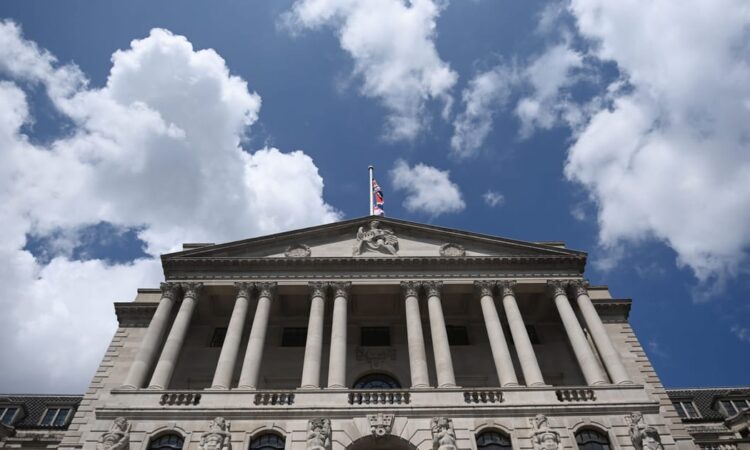
Britain’s central bank raised the Bank Rate by a bigger-than-expected 0.50 percent on Thursday, the 13th increase in a row, as it struggles to contain the worst inflation shock in western Europe.
Interest rates are now at a 15-year high of 5 percent and markets now expect them to rise by another full percentage point. The BoE’s counterparts in the U.S. and Europe, by contrast, have been tentatively signalling that their monetary tightening cycles are nearing their end.
“The Bank of England has … launched a rate grenade at the specter of ongoing inflation,” Neil Birrell, Chief Investment Officer at Premier Miton Investors said in e-mailed comments. Data published on Wednesday showed consumer prices rose 8.7 percent on the year in May, while underlying inflation accelerated.
Compounding the problem facing the Old Lady of Threadneedle Street is the idiosyncratic nature of the mortgage market in Britain, which is halfway through a huge and painful reset of fixed-rate loans that were taken out at rock-bottom rates two years ago. A two-year fixed-rate mortgage now costs over 6 percent.
“The Bank of England has one stick and it’s a wooden one and all they can do is beat the public with that stick,” said Justin Moy, a broker at EHF Mortgages in Essex. “It’s a bit like a bees’ nest: do you touch it lightly or thump it?”
However, Rightmove analyst Matt Smith was more sanguine, nodding to the fact that longer-term bond yields, which reflect inflation expectations, fell in response to the news.
“If today’s news does provide some reassurance to the markets, then we’d hope to see some stability return to the mortgage market, which will help those looking to take out a mortgage this year to plan ahead,” Smith said.
Both Prime Minister Rishi Sunak and Chancellor Jeremy Hunt stood by the Bank’s actions on Thursday and ruled out help for homeowners. Hunt is due to meet some of the country’s mortgage lenders on Friday to discuss ways in which they can help struggling households. Sunak has insisted his pledge to halve inflation this year was ” hard” but ” not impossible” (the Bank itself repeated that it expects headline inflation “to fall significantly” in the second half of this year in the statement accompanying its decisions).
Bailey, who has been guilty of repeated communications lapses in recent months, said on Thursday he’s acutely aware of the pain that is to come but stressed there is no alternative.
“We know this is hard – many people with mortgages or loans will be understandably worried about what this means for them. But if we don’t raise rates now, it could be worse later,” Bailey said in a separate statement following the decision. “We will continue to do whatever is necessary.”
Financial markets are now pricing in a terminal rate of over 6 percent — their highest since 2001. By comparison, The Federal Reserve, which opted to keep rates steady at 5 percent at its latest meeting, is seen raising rates by just a quarter point more. The European Central Bank, whose deposit rate stands at 3.5 percent, is only expected to raise another half a percent.
Economists noted the Bank had not changed its guidance about the future path for rates, but indicated rather that it would be guided by the inflation data.
“It’s clear that until we begin to see some improvement in the official inflation statistics, the committee won’t be content with pausing,” ING economists wrote in a note. “We’re tempted to say that today’s 50 basis point move won’t become a new trend, but two further 25 basis point hikes seem like the most likely route after today’s meeting.”
A basis point is one-hundredth of a percent.
The Bank’s actions appear to have convinced remaining doubters that it is prepared to tip the economy into recession if that is what is needed to bring down inflation.
“We think this will trigger a recession in the U.K. and that’s required to reduce inflation,” analysts at Capital Economics wrote in a note to clients. “The risk is that the Bank needs to raise rates further to get inflation down, meaning that chances of a bigger recession are growing.”
Blackrock, the world’s largest asset manager, has forecast U.K. economic growth will be less than 3 percent between 2022 and 2026, as Britain faces years of damage from higher interest rates.
“If central banks want to get inflation all the way down to their 2 percent target, that comes with a significant growth cost,” said Vivek Paul, U.K. chief investment strategist at Blackrock. Attention will begin to switch from the damage done by high inflation to the damage done by high rates.”
However, the Bank said the economy was doing better than expected, with unemployment remaining low, wage growth high and consumer demand “resilient.”
And on the brighter side, while mortgages may be getting more expensive, tourists’ spending money will go further.
“The UK’s higher inflation and more hawkish central bank is likely to drive sterling higher versus the dollar over the course of the year,” said Caroline Simmons, senior U.K. economist with UBS Global Wealth Management, adding that she sees sterling at $1.38 in a year’s time. The pound, which has risen nearly 3 percent in the last month against the dollar as expectations for higher rates have risen, eased off a little after the decision to stand around $1.2750.





